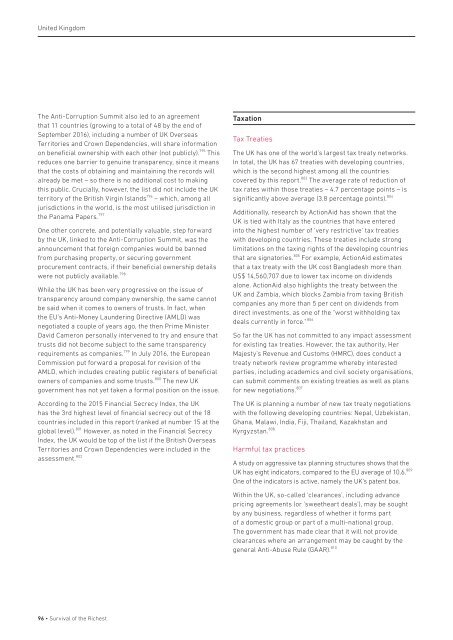You also want an ePaper? Increase the reach of your titles
YUMPU automatically turns print PDFs into web optimized ePapers that Google loves.
United Kingdom<br />
The Anti-Corruption Summit also led to an agreement<br />
that 11 countries (growing to a total <strong>of</strong> 48 by <strong>the</strong> end <strong>of</strong><br />
September 2016), including a number <strong>of</strong> UK Overseas<br />
Territories and Crown Dependencies, will share information<br />
on beneficial ownership with each o<strong>the</strong>r (not publicly). 795 This<br />
reduces one barrier to genuine transparency, since it means<br />
that <strong>the</strong> costs <strong>of</strong> obtaining and maintaining <strong>the</strong> records will<br />
already be met – so <strong>the</strong>re is no additional cost to making<br />
this public. Crucially, however, <strong>the</strong> list did not include <strong>the</strong> UK<br />
territory <strong>of</strong> <strong>the</strong> British Virgin Islands 796 – which, among all<br />
jurisdictions in <strong>the</strong> world, is <strong>the</strong> most utilised jurisdiction in<br />
<strong>the</strong> Panama Papers. 797<br />
One o<strong>the</strong>r concrete, and potentially valuable, step forward<br />
by <strong>the</strong> UK, linked to <strong>the</strong> Anti-Corruption Summit, was <strong>the</strong><br />
announcement that foreign companies would be banned<br />
from purchasing property, or securing government<br />
procurement contracts, if <strong>the</strong>ir beneficial ownership details<br />
were not publicly available. 798<br />
While <strong>the</strong> UK has been very progressive on <strong>the</strong> issue <strong>of</strong><br />
transparency around company ownership, <strong>the</strong> same cannot<br />
be said when it comes to owners <strong>of</strong> trusts. In fact, when<br />
<strong>the</strong> EU’s Anti-Money Laundering Directive (AMLD) was<br />
negotiated a couple <strong>of</strong> years ago, <strong>the</strong> <strong>the</strong>n Prime Minister<br />
David Cameron personally intervened to try and ensure that<br />
trusts did not become subject to <strong>the</strong> same transparency<br />
requirements as companies. 799 In July 2016, <strong>the</strong> European<br />
Commission put forward a proposal for revision <strong>of</strong> <strong>the</strong><br />
AMLD, which includes creating public registers <strong>of</strong> beneficial<br />
owners <strong>of</strong> companies and some trusts. 800 The new UK<br />
government has not yet taken a formal position on <strong>the</strong> issue.<br />
According to <strong>the</strong> 2015 Financial Secrecy Index, <strong>the</strong> UK<br />
has <strong>the</strong> 3rd highest level <strong>of</strong> financial secrecy out <strong>of</strong> <strong>the</strong> 18<br />
countries included in this report (ranked at number 15 at <strong>the</strong><br />
global level). 801 However, as noted in <strong>the</strong> Financial Secrecy<br />
Index, <strong>the</strong> UK would be top <strong>of</strong> <strong>the</strong> list if <strong>the</strong> British Overseas<br />
Territories and Crown Dependencies were included in <strong>the</strong><br />
assessment. 802<br />
Taxation<br />
Tax Treaties<br />
The UK has one <strong>of</strong> <strong>the</strong> world’s largest tax treaty networks.<br />
In total, <strong>the</strong> UK has 67 treaties with developing countries,<br />
which is <strong>the</strong> second highest among all <strong>the</strong> countries<br />
covered by this report. 803 The average rate <strong>of</strong> reduction <strong>of</strong><br />
tax rates within those treaties – 4.7 percentage points – is<br />
significantly above average (3.8 percentage points). 804<br />
Additionally, research by ActionAid has shown that <strong>the</strong><br />
UK is tied with Italy as <strong>the</strong> countries that have entered<br />
into <strong>the</strong> highest number <strong>of</strong> ‘very restrictive’ tax treaties<br />
with developing countries. These treaties include strong<br />
limitations on <strong>the</strong> taxing rights <strong>of</strong> <strong>the</strong> developing countries<br />
that are signatories. 805 For example, ActionAid estimates<br />
that a tax treaty with <strong>the</strong> UK cost Bangladesh more than<br />
US$ 14,560,707 due to lower tax income on dividends<br />
alone. ActionAid also highlights <strong>the</strong> treaty between <strong>the</strong><br />
UK and Zambia, which blocks Zambia from taxing British<br />
companies any more than 5 per cent on dividends from<br />
direct investments, as one <strong>of</strong> <strong>the</strong> "worst withholding tax<br />
deals currently in force." 806<br />
So far <strong>the</strong> UK has not committed to any impact assessment<br />
for existing tax treaties. However, <strong>the</strong> tax authority, Her<br />
Majesty’s Revenue and Customs (HMRC), does conduct a<br />
treaty network review programme whereby interested<br />
parties, including academics and civil society organisations,<br />
can submit comments on existing treaties as well as plans<br />
for new negotiations. 807<br />
The UK is planning a number <strong>of</strong> new tax treaty negotiations<br />
with <strong>the</strong> following developing countries: Nepal, Uzbekistan,<br />
Ghana, Malawi, India, Fiji, Thailand, Kazakhstan and<br />
Kyrgyzstan. 808<br />
Harmful tax practices<br />
A study on aggressive tax planning structures shows that <strong>the</strong><br />
UK has eight indicators, compared to <strong>the</strong> EU average <strong>of</strong> 10.6. 809<br />
One <strong>of</strong> <strong>the</strong> indicators is active, namely <strong>the</strong> UK’s patent box.<br />
Within <strong>the</strong> UK, so-called ‘clearances’, including advance<br />
pricing agreements (or ‘swee<strong>the</strong>art deals’), may be sought<br />
by any business, regardless <strong>of</strong> whe<strong>the</strong>r it forms part<br />
<strong>of</strong> a domestic group or part <strong>of</strong> a multi-national group.<br />
The government has made clear that it will not provide<br />
clearances where an arrangement may be caught by <strong>the</strong><br />
general Anti-Abuse Rule (GAAR). 810<br />
96 • <strong>Survival</strong> <strong>of</strong> <strong>the</strong> <strong>Richest</strong>


